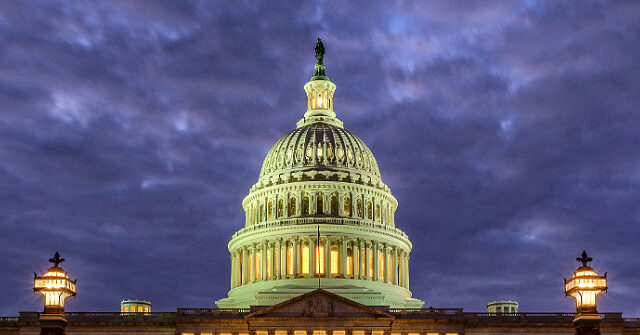Share this @internewscast.com
The Democrats faced a setback on Sunday as they conceded to a government funding deal without securing significant benefits.
On Sunday night, eight Democratic senators joined 42 Republicans in a pivotal procedural vote, advancing a continuing resolution (CR) to fund the government.
This motion passed with a narrow 60 to 40 vote, setting the stage for a subsequent vote on a straightforward CR that extends through January 30, 2026. This resolution also incorporates three relatively uncontroversial appropriations bills, covering agriculture, military construction-Veterans Affairs, and the legislative branch for the fiscal year.
The agreement ensures federal employees receive back pay and confirms the rehiring of over 4,000 federal workers laid off during the shutdown. Furthermore, it prohibits any future workforce reductions until January 30. This figure pales compared to the approximately 250,000 positions cut by the Trump administration before the shutdown.
Crucially, the deal does not secure an extension for the Covid-era enhanced subsidies for Obamacare premiums. Democrats only managed to secure a commitment for a vote on a bill of their choosing.
“As I have emphasized to my Democratic colleagues, I will arrange a vote on their proposal, with a commitment to hold it by the second week of December,” stated Majority Leader John Thune (R-SD) during his remarks on the Senate floor prior to the vote.
Even if such a bill were to pass the Senate, Speaker Mike Johnson (R-LA) has not committed to bringing it to the floor of the House.
The result is that Democrats once again overpromised results to their base but came up empty-handed, inflicting forty days of pain for nothing of substance.
Democrat Sens. Maggie Hassan (NH), Jeanne Shaheen (NH), Dick Durbin (IL), Jacky Rosen (NV), and Tim Kaine (D-VA) supported the procedural vote. They joined Sens. Catherine Cortez-Masto (D-NM), Angus King (I-ME), and John Fetterman (D-PA), who had previously voted to allow the House-passed CR to advance.
Republican Sen. Rand Paul (KY) voted no, as he has done throughout prior rounds of votes.
The result is another victory for Thune, who kept the Senate in session over the weekend to seek a deal, promising to keep senators working until a deal was struck.
Perhaps more significantly, the vote is the latest — and most damaging — setback for Senate Minority Leader Chuck Schumer (D-NY). His own rank-and-file members — centrists and the most liberal — condemned his shutdown strategy Sunday night.
Schumer is increasingly becoming the primary villain for the ascendant left inside the Democratic Party, and his hold on the position of Minority Leader seems increasingly tenuous.
In a sign of how toxic the shutdown end will be for Democrats, no Democrat senators who voted Sunday to begin the process of reopening the government are up for reelection in 2026.
Cortez-Masto, Fetterman, and Hassan will not have to run again until 2028, with Kaine, Rosen, and King not up again until 2030. Shaheen and Durbin are retiring.
Sen. Jon Ossoff (D-GA), the most endangered Democrat incumbent, voted no.
The vote was held open for well over an additional hour to allow Sen. John Cornyn (R-TX), who was in Texas during a brutal three-way primary fight, to arrive in Washington.
The Senate must receive unanimous consent on time agreements to enable speedy passage, but a vote on final passage is likely by the middle of the week. The amended bill must then pass the House.

















